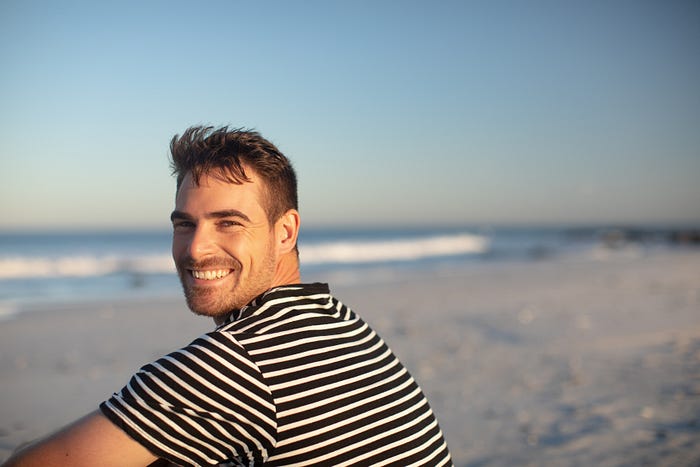The choice available to us all

Published in On The Couch
1 day ago (Medium.com)

Life lessons often come to us from unexpected places.
Sometimes by chance. Sometimes because we’re ready for them. Sometimes because we are reminded of something we already believed in.
One of those lessons dropped in my lap this week. At the end of an appointment with an osteopath, I’d asked if I could continue my normal sports activities.
He raise an eyebrow, then delivered his seven-word edit.
“Avoidance is not a strategy for anything.”
The path of least resistance
In my work as a psychologist, avoidance is a hovering presence.
That’s because it’s arguably the most common strategy for dealing with anything that causes stress or pain — or threatens to do so.
It is used to escape facing the truth — about relationships or jobs or health or finances or addictions.
It is used to get out of competitions or difficult conversations, or to say no to invitations, social activities and opportunities.
It is used to dodge making public speeches, taking a flight, leaving the house, or anything else that sparks fear.
Under the banner of procrastination, some use it to delay doing chores or tax returns, writing that novel/starting that business or going after other big goals or dreams.
Avoidance is used because it’s the path of least resistance.
It’s the easy road. Until it’s not.
We’re not born avoidant
Avoidance isn’t embedded into our DNA.
Yes, some people have temperaments that promote it — but it’s most frequently a learned behaviour.
Some people are born or raised in circumstances that don’t support their emotional development. Maybe they were exposed to trauma, challenging life events or chronic stress?
Maybe their parents expected them to glue on a happy face no matter what was going on? Maybe they were under pressure to present the facade of the perfect family? Maybe they were never given the space to express their tougher emotions? Or helped to understand their feelings?
And that learning shaped them.
To be fair, none of us are above a few avoidance tactics — especially when it comes to stacking the dishwasher, putting the rubbish out and doing boring life admin.
But it becomes a problem when it’s repeatedly used as a coping mechanism for dealing with difficult or traumatic emotions, situations, or responsibilities.
And when it creeps under the carpet — when it becomes a habit that stops you from addressing important issues and/or potentially shrinks your life — you need to step into the ring with it.
I’ve worked with lots of people who’ve come to this place.
They’ve been unable to face the truth of their circumstances — or perhaps it’s more accurate to say unable to face the painful feelings that the truth might stir up for them.
Like those who won’t step on the scales because they can’t deal with the reality of their weight. Or who won’t log into their bank account and face the mounting credit card debt.
There have been others too scared to date because of potential rejection or abandonment — or in denial about the toxicity of their relationships; others who work ridiculously long hours even when their minds and bodies are screaming for a break.
Others who avoid things to avoid things — refuse to do anything that will make them feel uncomfortable — or out of control.
I was left to painstakingly deal with the aftermath of my avoidance later in life, in therapy or through the lyrics of my songs. Alanis Morissette
Cage or arena?
I get it, life is hard — even brutal sometimes.
It makes perfect sense to cower away from things that stir up emotional discomfort. That make you feel vulnerable. That scare you.
But putting important things off? Bailing on things when they get hard? Hiding away from reality? Not giving your talent a chance to breathe — and fly?
Those tactics will confine you to a cage. And, no matter how gold the bars, it’s still a cage.
At some point, we all have to decide — cage or arena? Do I want to stay within the limits, keep doing what I know, or do I want to show up when I don’t know what’s going to happen?
Here’s how vulnerability researcher Brené Brown puts it:
“I want to be in the arena. I want to be brave with my life. And when we make the choice to dare greatly, we sign up to get our asses kicked. We can choose courage or we can choose comfort, but we can’t have both. Not at the same time. Vulnerability is not winning or losing; it’s having the courage to show up and be seen when we have no control over the outcome. Vulnerability is not weakness; it’s our greatest measure of courage….For me, if you’re not in the arena getting your ass kicked, I’m not interested in your feedback.”
But back to my osteopath, and his wise words.
Avoidance is a coping mechanism. It might (temporarily) protect you.
But it’s not a strategy to move your life forward. It won’t expose you to discomfort. It won’t make you stronger. It won’t allow you to be fully human.
Stepping into the arena — having the courage to show up — will.
Each fortnight I send out a free newsletter offering practical psychology tips and tools for personal growth and performance. Come join us!

Written by Karen Nimmo
·Editor for On The Couch
Clinical psychologist, author of 4 books. Editor of On the Couch: Practical psychology for health and happiness. karen@onthecouch.co.nz
